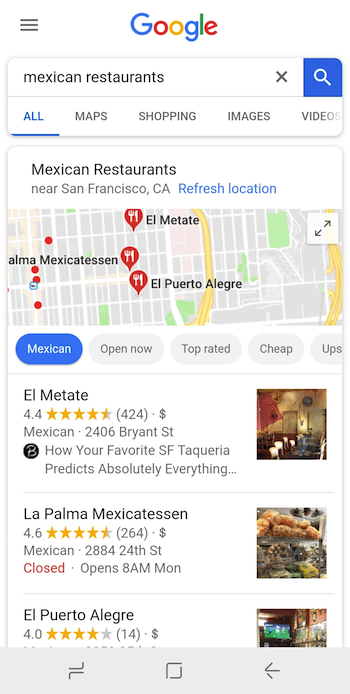A few days ago, my friend (and super smart marketer) Ty Magnin sent me the following email:
Hey man,
How ya been?
Have you been following all the talk of Google becoming the ultimate aggregator for search? And punishing people that try to be search-focused aggregators themselves?
Pages that are only for robots to crawl will actually hurt DA. I wonder how our current model of hub posts might need to evolve. Perhaps more meat on the skeleton? Thinking about our user onboarding academy.
The gist is that Google is serving up fewer and fewer SERPs with 10 blue links. In place of that, they are serving up rich media...media that often means the searcher doesn't even need to click through to the source.
If you search for a restaurant, you'll see something like the image below in place of links to a Yelp page. This puts sites like Yelp in a really tough position. But does it affect B2B content in the same way it affects B2C sites that aggregate content on movies, books, events, etc?

I did some reading on the topic, specifically Casey Winters' recent post Google’s New Strategy and How It Affects Aggregators and Ben Thompson's Aggregation Theory. I put together the following response, which I think may be interesting to others working in B2B content marketing.
Hey Ty,
I read Casey's post and have been reading a lot of Ben Thompson lately. Here are a few thoughts:
- Google as the ultimate aggregator seems to primarily affect B2C businesses at the moment. That could certainly change, but that's where the most volume is, and therefore it's the most interesting to Google. I would not want to be a food or restaurant blogger right now. In the B2B space, sites like G2Crowd should be most concerned.
- I think that business model plays a significant role as well. Sites that make money from ads (and are almost always B2C) have much more at stake here. Because SaaS companies don't monetize with ads, they can create a really good user experience which makes it harder for Google to improve. Compare that to a recipe site covered with crappy ads...it's really easy to improve on that.
- Sites with user generated content tend to have tons and tons of pages. This makes for 1) a lot of low quality content and 2) a serious challenge for SEOs to content with. They have to curate, cross-cut and aggregate all that content to try to make it into something useful. In B2B, each page is created very deliberately. I wouldn't worry too much about creating too many pages or having pages that are only intended for search. The scale of it is so small in comparison to a site like Yelp or TripAdvisor.
- One other big factor is schema markup. Google seems to want to take over for events, books, flights, restaurants, etc. because the publishers can handle all the data organization via schema. This isn't something we've seen a ton of in B2B content marketing, with the exception of the answer box. I think there's something here for product driven searches (i.e. "user onboarding tool") but nothing yet for content driven searches (i.e. "user journey mapping").
We've got hubs running for a number of customers right now and in every case they are working well. We're always keeping an eye on analytics and should notice any changes very early on.
For the time being, I don't believe Google's aggressive efforts to take over its own SERPs will play a significant role in B2B content marketing. That could, of course, change and if it does, you can read about it or on the Animalz blog first.

